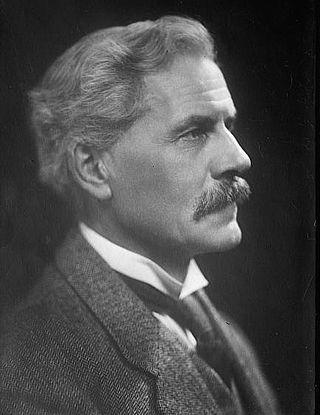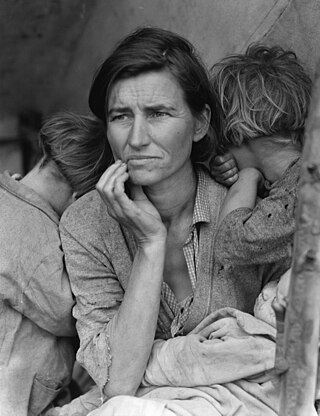
Unemployment, according to the OECD, is the proportion of people above a specified age not being in paid employment or self-employment but currently available for work during the reference period.

Welfare spending is a type of government support intended to ensure that members of a society can meet basic human needs such as food and shelter. Social security may either be synonymous with welfare, or refer specifically to social insurance programs which provide support only to those who have previously contributed, as opposed to social assistance programs which provide support on the basis of need alone. The International Labour Organization defines social security as covering support for those in old age, support for the maintenance of children, medical treatment, parental and sick leave, unemployment and disability benefits, and support for sufferers of occupational injury.
The Great Depression in the United Kingdom also known as the Great Slump, was a period of national economic downturn in the 1930s, which had its origins in the global Great Depression. It was Britain's largest and most profound economic depression of the 20th century. The Great Depression originated in the United States in late 1929 and quickly spread to the world. Britain did not experience the boom that had characterized the U.S., Germany, Canada and Australia in the 1920s, so its effect appeared less severe. Britain's world trade fell by half (1929–33), the output of heavy industry fell by a third, employment profits plunged in nearly all sectors. At the depth in summer 1932, registered unemployed numbered 3.5 million, and many more had only part-time employment. However at the same time, from 1929 to 1933 employment dipped only to 94.9% relative to 1929 employment metrics and recovery was seen as early at 1933. The positive trend continued across real national income and wages. New houses built increased by 33% from 1929 to 1933, while profits, prices, export volume and value, and imports volume and value dropped. Overall, while all these metrics were concerning to parliament and businessmen along with devastating industrial regions, the common person especially in areas around London did not experience major hardship and even prospered.

Unemployment benefits, also called unemployment insurance, unemployment payment, unemployment compensation, or simply unemployment, are payments made by governmental bodies to unemployed people. Depending on the country and the status of the person, those sums may be small, covering only basic needs, or may compensate the lost time proportionally to the previous earned salary.

The causes of the Great Depression in the early 20th century in the United States have been extensively discussed by economists and remain a matter of active debate. They are part of the larger debate about economic crises and recessions. The specific economic events that took place during the Great Depression are well established.

The Federal Emergency Relief Administration (FERA) was a program established by President Franklin D. Roosevelt in 1933, building on the Hoover administration's Emergency Relief and Construction Act. It was replaced in 1935 by the Works Progress Administration (WPA).

The worldwide Great Depression of the early 1930s was a social and economic shock that left millions of Canadians unemployed, hungry and often homeless. Few countries were affected as severely as Canada during what became known as the "Dirty Thirties", due to Canada's heavy dependence on raw material and farm exports, combined with a crippling Prairies drought known as the Dust Bowl. Widespread losses of jobs and savings ultimately transformed the country by triggering the birth of social welfare, a variety of populist political movements, and a more activist role for government in the economy.

The second MacDonald ministry was formed by Ramsay MacDonald on his reappointment as prime minister of the United Kingdom by King George V on 5 June 1929. It was the second time the Labour Party had formed a government; the first MacDonald ministry held office in 1924.

Australia was affected badly during the period of the Great Depression of the 1930s. The Depression began with the Wall Street Crash of 1929 and rapidly spread worldwide. As in other nations, Australia had years of high unemployment, poverty, low profits, deflation, plunging incomes, and lost opportunities for economic growth and personal advancement.

In the United States, the Great Depression began with the Wall Street Crash of October 1929 and then spread worldwide. The nadir came in 1931–1933, and recovery came in 1940. The stock market crash marked the beginning of a decade of high unemployment, famine, poverty, low profits, deflation, plunging farm incomes, and lost opportunities for economic growth as well as for personal advancement. Altogether, there was a general loss of confidence in the economic future.
The National Unemployed Workers' Movement was a British organisation set up in 1921 by members of the Communist Party of Great Britain. It aimed at drawing attention to the plight of unemployed workers during the post-First World War slump, the 1926 General Strike and later the Great Depression, and at fighting the Means Test.
Throughout the industrial world, cities were devastated during the Great Depression, beginning in 1929 and lasting through most of the 1930s. Worst hit were port cities and cities that depended on heavy industry, such as the steel and automotive industries. Service-oriented cities were hurt less severely. Political centers such as Canada, Texas, Washington, London and Berlin flourished during the Great Depression, as the expanded role of government added many new jobs.
Steward Machine Company v. Davis, 301 U.S. 548 (1937), was a case in which the U.S. Supreme Court upheld the unemployment compensation provisions of the Social Security Act of 1935, which established the federal taxing structure that was designed to induce states to adopt laws for funding and payment of unemployment compensation. The decision signaled the Court's acceptance of a broad interpretation of Congressional power to influence state laws.

Relief Camp Workers' Union was a Canadian Great Depression era relief union in which the workers employed in the Canadian government relief camps organized themselves into in the early 1930s. The RCWU was established by the Workers' Unity League and was associated with the Communist Party of Canada. The creation of the union was a direct response to the conditions of the camps and the lack of financial compensation for the work the men provided. The union is best known for helping to organize the On-to-Ottawa Trek during the Great Depression.
The Great Depression in the Netherlands occurred between 1933 and 1936, significantly later than in most other countries. It was a period of severe economic crisis in the 1930s which affected countries around the world, including the Netherlands.
Social security, in Australia, refers to a system of social welfare payments provided by Australian Government to eligible Australian citizens, permanent residents, and limited international visitors. These payments are almost always administered by Centrelink, a program of Services Australia. In Australia, most payments are means tested.
The white paper Full Employment in Australia, published in 1945, was the defining document of the official economic policy in Australia until the 1970s. For the first time, the Australian government accepted an obligation to guarantee full employment and to intervene as necessary to implement that guarantee. The preparation of the paper was ordered by The Australian Labor Party Prime Minister John Curtin and his Employment Minister John Dedman and undertaken by a group of economists headed by H. C. Coombs.

The Great Depression was a severe global economic downturn from 1929 to 1939. The period was characterized by high rates of unemployment and poverty; drastic reductions in liquidity, industrial production, and trade; and widespread bank and business failures around the world. The economic contagion began in 1929 in the United States, the largest economy in the world, with the devastating Wall Street stock market crash of October 1929 often considered the beginning of the Depression. Among the countries with the most unemployed were the U.S., the United Kingdom, and Germany.

The New Deal was a series of domestic programs, public work projects, and financial reforms and regulations enacted by President Franklin D. Roosevelt in the United States between 1933 and 1938, with the aim of addressing the Great Depression, which began in 1929. Roosevelt introduced the phrase upon accepting the 1932 Democratic presidential nomination, and won the election in a landslide over Herbert Hoover, whose administration was viewed by many as doing too little to help those affected. It was widely believed that the depression was caused by inherent market instability, and that massive government intervention was necessary to stabilize and rationalize the economy.
The Unemployed Workers Movement (UWM) was a socialist activist organisation operating in Australia during the Great Depression. It advocated for expanded Welfare, and protections for the Unemployed and fought against evictions in working-class neighbourhoods and work for welfare schemes. In 1930 the UWM had an estimated 30,000 members.











